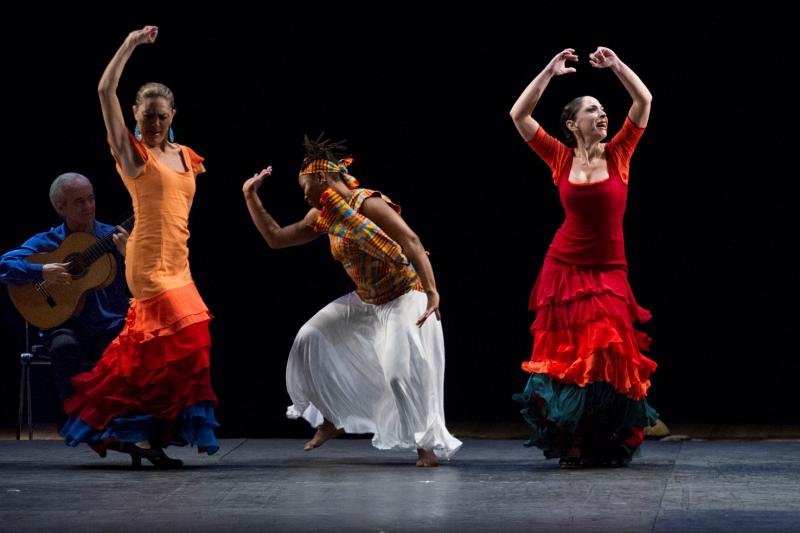Quimeras, Paco Peña and Dance Companies | reviews, news & interviews
Quimeras, Paco Peña and Dance Companies
Quimeras, Paco Peña and Dance Companies
Dazzling solos from Spain and Senegal, but collective social narrative weakens the impact

Happy truisms first: Paco Peña is still the greatest of flamenco guitarists, he works with a consummate team of regulars in the most vibrant of dance-art and he keeps it fresh by scouring the world for different players or ensembles to complement his own flamencistas. I’ll never forget equal artists Venezuelan Diego Alvarez, creating miracles from the simple plywood box with vibrating strings known as the cajón, and on this occasion the breathtaking Senegalese dancer Alboury Dabo.
Peña is no doubt sincere in giving his own impassioned take on travel in search of a chimerical (hence the title) better life, the pain of emigration for west Africans (that’s as far as I’d compromise in so naming the performers from Senegal or Guinea; labeling them"Africans" as the programme does at times is about as sensitive as describing the flamenco troupe simple as "European"). It works fine when briefly conjured, as in Peña's second-half solo against a voice reciting Caroline Bird’s poem “Feet on Road”. But it makes a laboured context for the first half’s culminating showdown of feet, hands and drums as a confrontation of a buleria with “Fore Sacre”, the west African team’s supposed reaction to official Spanish aggression against immigrants. And it sabotaged, for me at any rate, a 20 minute flamenco sequence in a Cordóba tavern suggested by a semi circle of chairs which keep out the African waiters. Their presence might have been suggested in a minute, but instead they linger to make us uncomfortable before the free and the oppressed finally come together.
 Framing ensembles dazzle, the hieratic flamenco dancers pillar-like between the whirling, frenetic routines of their colleagues. The bewitching solos all seem to belong to the Spaniards, with Charo Espino mesmerizing in a dream sequence; and in what sometimes feels like a battle of song and dance you have to grant the higher level of harmonic and vocal interest to Peña’s group, with only the percussive cross-rhythms of both groups equally matched. There’s a brief frisson when Peña’s multi-layered guitar, which like the greatest of pianists he’s able to wield with the different sound-planes of a haunting bass and a more ethereal treble, overlaps with Aboubacar Syla on the kalimba or (unpoetically translated) thumb piano, but that’s quickly gone.
Framing ensembles dazzle, the hieratic flamenco dancers pillar-like between the whirling, frenetic routines of their colleagues. The bewitching solos all seem to belong to the Spaniards, with Charo Espino mesmerizing in a dream sequence; and in what sometimes feels like a battle of song and dance you have to grant the higher level of harmonic and vocal interest to Peña’s group, with only the percussive cross-rhythms of both groups equally matched. There’s a brief frisson when Peña’s multi-layered guitar, which like the greatest of pianists he’s able to wield with the different sound-planes of a haunting bass and a more ethereal treble, overlaps with Aboubacar Syla on the kalimba or (unpoetically translated) thumb piano, but that’s quickly gone.
Of course the simpler force of the west African numbers would work its magic over a longer trance-span, something only partially allowed in the climactic sequence of the evening. Dabo tumbles, somersaults and spins to the African blues; principal male flamenco dancer Angel Muñoz shows his indigenous charisma before taking up the unfamiliar form. And of course he’s no match for Dabo because the flamenco art requires stylized rigidity and columnar poise; hip-swivelling is alien to the master.
The final sequence at last lets us sit back and simply relish skills on both sides. But there are too many flaws in the presentation. Not, I think, in whatever Jude Kelly’s role as director entailed; the lighting and the compositions are impressive. But the amplification is flattening and faulty – a man in a headlamp had twice to come on and sort out a failed mike – and if Peña wants to inject meaning, then we need supertitles to the songs (a long-standing grumble of mine regarding the level at which we understand so-called “world music”). Still, our main man’s enterprise and questing mind at 71 are amazing, and this won’t stop me seeking out his next meeting of cultures.
rating
Share this article
more Dance
 MacMillan Celebrated, Royal Ballet review - out of mothballs, three vintage works to marvel at
Less-known pieces spanning the career of a great choreographer underline his greatness
MacMillan Celebrated, Royal Ballet review - out of mothballs, three vintage works to marvel at
Less-known pieces spanning the career of a great choreographer underline his greatness
 Carmen, English National Ballet review - lots of energy, even violence, but nothing new to say
Johan Inger's take on Carmen tries but fails to make a point about male violence
Carmen, English National Ballet review - lots of energy, even violence, but nothing new to say
Johan Inger's take on Carmen tries but fails to make a point about male violence
 WAKE, National Stadium, Dublin review - a rainbow river of dance, song, and so much else
THISISPOPBABY serves up a joyous tapestry of Ireland contemporary and traditional
WAKE, National Stadium, Dublin review - a rainbow river of dance, song, and so much else
THISISPOPBABY serves up a joyous tapestry of Ireland contemporary and traditional
 Swan Lake, Royal Ballet review - grand, eloquent, superb
Liam Scarlett's fine refashioning returns for a third season, and looks better than ever
Swan Lake, Royal Ballet review - grand, eloquent, superb
Liam Scarlett's fine refashioning returns for a third season, and looks better than ever
 First Person: Ten Years On - Flamenco guitarist Paco Peña pays tribute to his friend, the late, great Paco de Lucía
On the 10th anniversary of his death, memories of the prodigious musician who broadened the reach of flamenco into jazz and beyond
First Person: Ten Years On - Flamenco guitarist Paco Peña pays tribute to his friend, the late, great Paco de Lucía
On the 10th anniversary of his death, memories of the prodigious musician who broadened the reach of flamenco into jazz and beyond
 Dance for Ukraine Gala, London Palladium review - a second rich helping of international dancers
Ivan Putrov's latest gala was a satisfying mix of stars and young hopefuls
Dance for Ukraine Gala, London Palladium review - a second rich helping of international dancers
Ivan Putrov's latest gala was a satisfying mix of stars and young hopefuls
 Nelken: A Piece by Pina Bausch, Sadler's Wells review - welcome return for an indelible classic
A new generation of gifted performers for us to get to know
Nelken: A Piece by Pina Bausch, Sadler's Wells review - welcome return for an indelible classic
A new generation of gifted performers for us to get to know
 Dark With Excessive Bright, Royal Ballet review - a close encounter with dancers stripped bare
The Royal's Festival of New Choreography launches with an unforgettable walk in the dark
Dark With Excessive Bright, Royal Ballet review - a close encounter with dancers stripped bare
The Royal's Festival of New Choreography launches with an unforgettable walk in the dark
 La Strada, Sadler's Wells review - a long and bumpy road
Even the exceptional talents of Alina Cojocaru can't save dance adaptation of Fellini film
La Strada, Sadler's Wells review - a long and bumpy road
Even the exceptional talents of Alina Cojocaru can't save dance adaptation of Fellini film
 First Person: pioneering juggler Sean Gandini reflects on how the spirit of Pina Bausch has infiltrated his work
As Tanztheater Wuppertal Pina Bausch's 'Nelken' comes to Sadler’s Wells, a tribute from across the art forms
First Person: pioneering juggler Sean Gandini reflects on how the spirit of Pina Bausch has infiltrated his work
As Tanztheater Wuppertal Pina Bausch's 'Nelken' comes to Sadler’s Wells, a tribute from across the art forms
 Manon, Royal Ballet review - a glorious half-century revival of a modern classic
Fifty years on, Kenneth MacMillan's crash-and-burn anti-heroine is riding high
Manon, Royal Ballet review - a glorious half-century revival of a modern classic
Fifty years on, Kenneth MacMillan's crash-and-burn anti-heroine is riding high
 Giselle, English National Ballet, Coliseum review - if you go down to the woods today, beware of the Wilis
A revival of Mary Skeaping's lovingly researched production, packed with lively detail and terrific suspense
Giselle, English National Ballet, Coliseum review - if you go down to the woods today, beware of the Wilis
A revival of Mary Skeaping's lovingly researched production, packed with lively detail and terrific suspense

Add comment